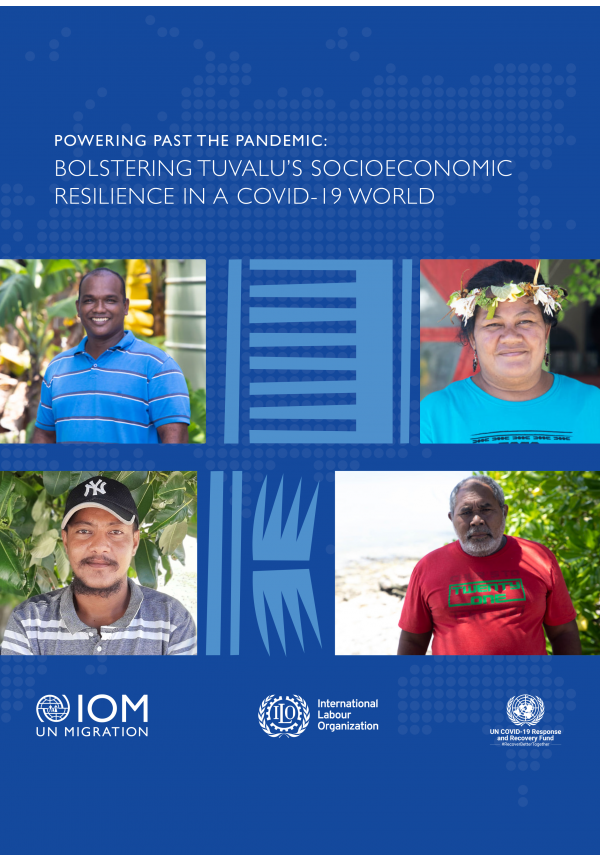
Powering Past the Pandemic: Bolstering Tuvalu’s Socioeconomic Resilience in a Covid-19 World
This assessment report was produced under the project “Enhancing Food Security and Building Socioeconomic Resilience to Covid-19 in Tuvalu” supported by the United Nations (UN) COVID-19 Response and Recovery Multi Partner Trust Fund and delivered through a partnership of the International Organization for Migration (IOM) and the International Labour Organization (ILO). The report aims to understand the effects of COVID-19 on Tuvalu’s labour market, specifically the impacts on employment, businesses and households. To this end, a field survey and focused group meetings were carried out from 11 to 21 November 2020 in collaboration with the National Tripartite Committee made up of relevant Government departments, employers, and worker organizations. A total of of 32 businesses (comprising 10% of total businesses), 189 workers (20% of all workers), 23 laid-off employees (8% of all laid-off workers) and 87 households (comprising 10 % of households) on the main island of Funafuti were covered under the survey.
Survey results indicate that while the effects of COVID-19 during the immediate state of emergency period has been marginal on Tuvalu, the situation may deteriorate should the pandemic persist. This is primarily due to Tuvalu’s dependence on external supplies and remittances from the Tuvaluan diaspora. Fortunately, because Government and private sector are the principal employers, impact on majority of workforce has been minimal. The report concludes with a set of innovative recommendations to support the Government of Tuvalu to embark on the path of economic recovery once the pandemic subsides.
Read More
- List of Acronyms
- Acknowledgements
- Executive Summary
- Section I The Assessment: Approach, Methodology and Process
- 1.1 Context
- 1.2 Objectives
- 1.3 Methodology
- Section II Before COVID-19: The Socioeconomic and employment situation in Tuvalu
- 2.1 Population, poverty and inequality
- 2.2 Employment
- 2.2.1 Employment Classification
- 2.2.2 Unemployment, quality of jobs and vulnerable workers
- 2.2.3 Youth development
- 2.2.4 Gender equality and empowerment of women
- 2.3 The Economy
- 2.3.1 Gross domestic product (GDP)
- 2.3.2 Remittances
- 2.3.3 Fisheries licence
- 2.3.4 Income from Dot.TV
- 2.3.5 International aid
- 2.3.6 Trust funds
- 2.3.7 Exports
- 2.3.8 Foreign direct investment
- 2.3.9 Future outlook of the economy
- 2.4 Private sector landscape
- 2.5 Food and health security
- 2.6 Information and communication technology
- Section III COVID-19 Policy Frameworks and Response
- 3.1 ILO policy framework for COVID-19 response
- 3.2 IOM framework for COVID-19 response
- 3.3 Government of Tuvalu response
- 3.4 Regional impact — a snapshot
- 3.5 Global impact — an overview
- Section IV Impact of COVID-19: From the Perspective of Tuvaluans Survey Findings
- 4.1 Enterprise
- 4.1.1 Size and sectors
- 4.1.2 Employment
- 4.1.3 Impact on business working hours
- 4.1.4 Business continuity plans
- 4.1.5 Impact on business operations
- 4.1.6 Government support for businesses
- 4.1.7 Cash flow crunch for many businesses affecting operational sustainability
- 4.1.8 Changes experienced by businesses
- 4.1.9 Working arrangements
- 4.1.10 Post State of emergency plans by businesses
- 4.1.11 Assistance required to restore business operations
- 4.1.12 Borrowing during tate of emergency
- 4.2 Employees currently working but affected during state of emergency
- 4.2.1 Employees’ profile
- 4.2.2 Employees working agreements
- 4.2.3 Impact of the state of emergency on employees
- 4.2.4 Workers prepared to manage current soe and source alternate income should pandemic continue
- 4.2.5 Impact of state of emergency on employees
- 4.2.6 Workers postponed personal or family decisions
- 4.2.7 Employers support for workers during the state of emergency
- 4.2.8 Assistance expected from government by workers
- 4.2.9 Direct support given to workers by government
- 4.2.10 Workers’ financial priorities and family commitments
- 4.2.11 Health of workers during state of emergency
- 4.3 Workers laid-off during state of emergency
- 4.3.1 Profile of laid-off workers
- 4.3.2 Procedure for laying off workers
- 4.3.3 Impact on laid-off workers
- 4.3.4 Status of workers post lay-off
- 4.3.5 Government support received by laid-off workers
- 4.3.6 Laid-off workers planning for the future
- 4.4 Households
- 4.4.1 Household profile
- 4.4.2 Source of income
- 4.4.3 Remittances
- 4.4.4 Impact of COVID-19 on households
- 4.4.5 Support to households
- 4.1 Enterprise
- Section V Conclusions and Recommendations
- Recommendation
- 1a: Stimulating the economy and economic activities
- 1b: Food security and creating jobs and incomes
- Recommendation 2: Supporting businesses, workers and households
- Recommendation 3: Migration and remittances making it relevant
- Recommendation 4: Addressing unemployment
- Section VI
- The Way Forward
- References